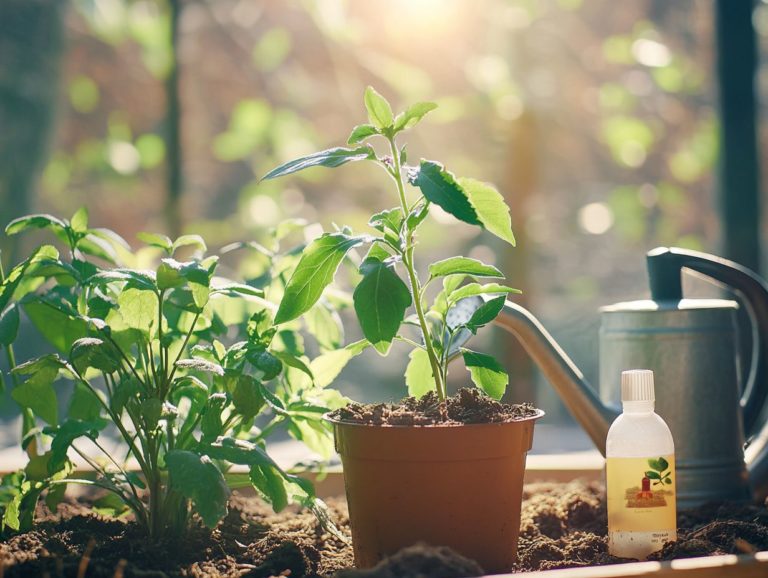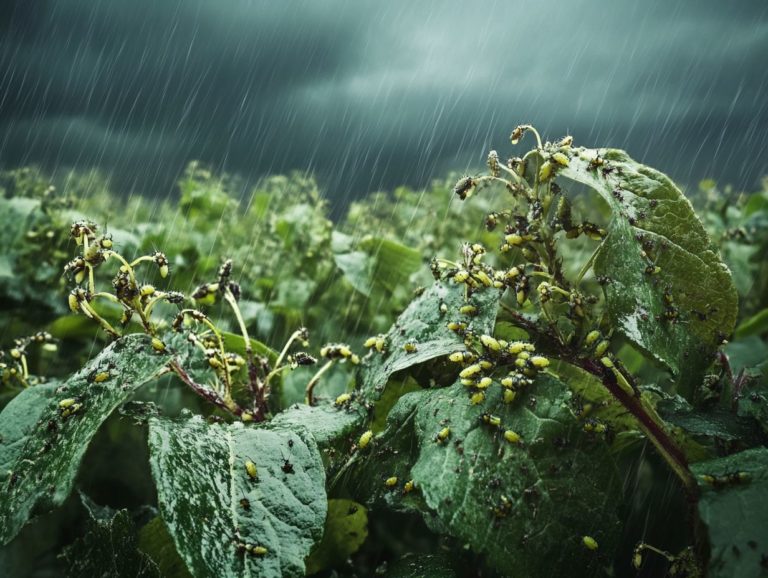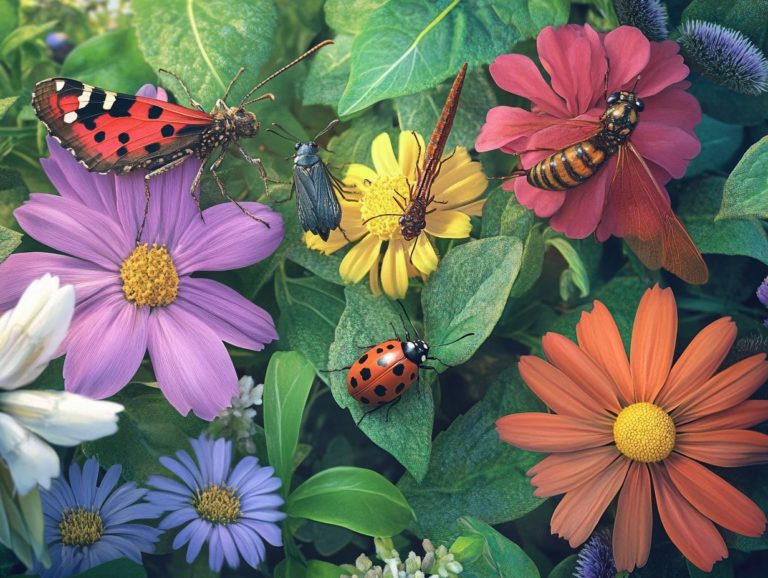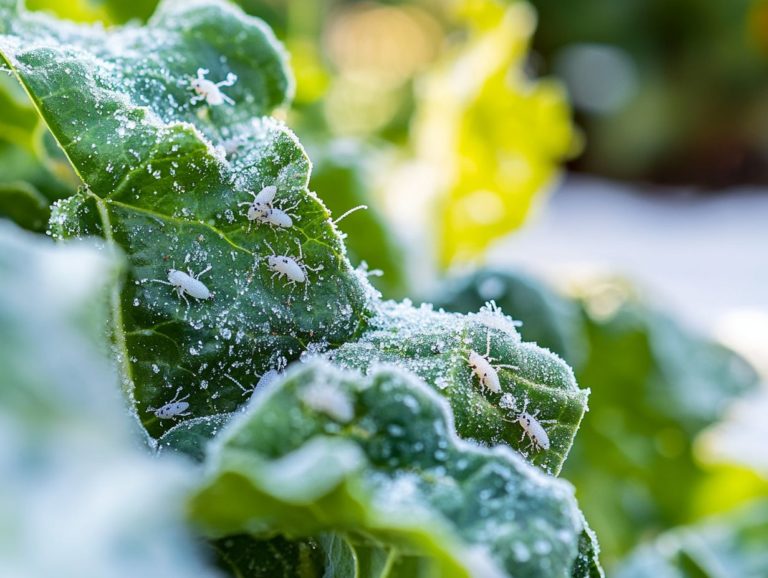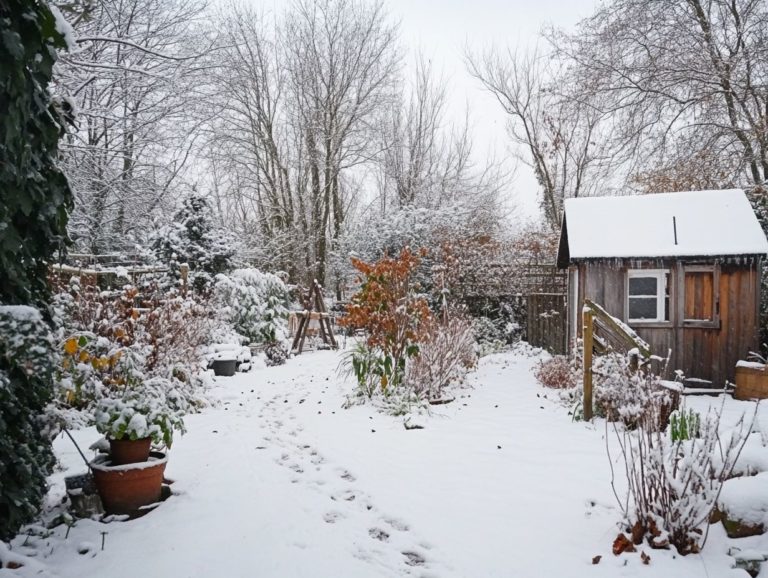How to Manage Weeds in Winter Gardens
Winter gardens can serve as your serene escape, but without diligent weed management, they risk becoming overwhelmed.
Recognizing how weeds affect plant growth and health is essential to nurturing a vibrant garden during the colder months. This article delves into common winter weeds, offering you effective control methods both natural and chemical and preventative strategies to maintain a weed-free oasis.
Furthermore, you ll discover best practices for safe and efficient weed removal. Act now to rid your garden of those pesky weeds for a vibrant winter!
Contents
- Key Takeaways:
- The Importance of Managing Weeds in Winter Gardens
- Identifying Common Winter Weeds
- Methods for Controlling Weeds in Winter Gardens
- Preventative Measures for Future Weed Growth
- Best Practices for Removing Weeds
- Frequently Asked Questions
- What are the common types of weeds found in winter gardens?
- How can I prevent weeds from growing in my winter garden?
- Are there any natural methods for managing weeds in winter gardens?
- What should I do with weeds that have already taken over my winter garden?
- Can I use mulch to control weeds in my winter garden?
- Is there a specific time of year to manage weeds in my winter garden?
Key Takeaways:
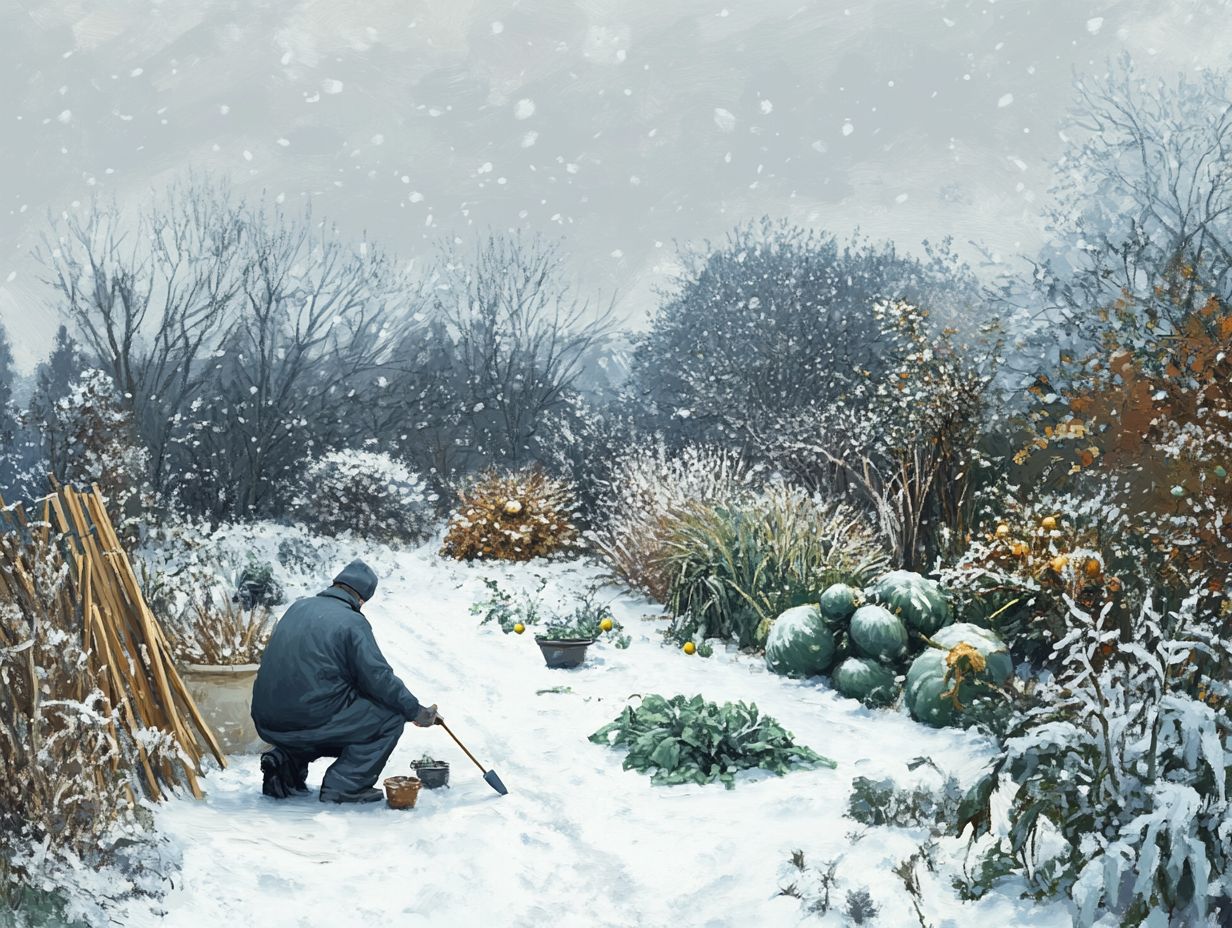
- Weeds can harm plant growth and health. Managing them is crucial.
- Identify winter weeds and use natural or chemical methods to control them.
- Maintain a weed-free garden with safe removal techniques.
The Importance of Managing Weeds in Winter Gardens
Managing weeds in your winter garden is essential for nurturing the health and growth of your plants as they gear up for the spring season. Consider navigating seasonal changes in winter gardening to enhance your gardening techniques.
Winter weeds don t just compete with your cherished plants for nutrients and water; they can also become a breeding ground for pests and diseases that jeopardize the overall vitality of your garden.
By employing effective weed control measures and adhering to proper garden maintenance practices, you can create an environment that allows your plants to thrive when they emerge from their resting phase, paving the way for a flourishing and vibrant spring growth.
Impact on Plant Growth and Health
The impact of weeds on your plants’ growth and health can be significant, as they compete fiercely for vital resources like water, nutrients, and sunlight, ultimately undermining the vigor of your garden.
You ll encounter various types of weeds annual, biennial, and perennial each presenting its own set of challenges to your cherished plant species. Annual weeds might spring up quickly, snatching resources before your desired plants have a chance to establish themselves.
Biennial weeds may take a bit longer to mature, but if left unchecked, they can create chaos over time. Then there are the perennial weeds, which can be particularly troublesome with their extensive root systems, allowing them to thrive through seasonal shifts.
Adopting effective weed control strategies is essential. The right herbicide (a chemical used to kill weeds) application can target these intruders without jeopardizing your valuable crops.
Practical lawn care tips like regular mowing and proper mulching can foster a healthier environment that discourages weed growth while enhancing the overall health of your plants.
Identifying Common Winter Weeds
Identifying common winter weeds is crucial for maintaining your garden effectively. This enables you to take targeted actions for weed control, and you can also learn about keeping your soil healthy in winter before they take over in the spring.
You’ll encounter a variety of prevalent winter weeds, such as dandelion, chickweed, henbit, deadnettle, and thistle. Each of these has its own unique characteristics and growth patterns that can disrupt the delicate balance of your garden’s ecosystem. To combat these challenges, consider learning how to start your winter gardening early.
By mastering the art of weed identification, you can implement timely and efficient weed management strategies, ultimately preserving the health and beauty of your garden.
Types of Weeds and How to Identify Them
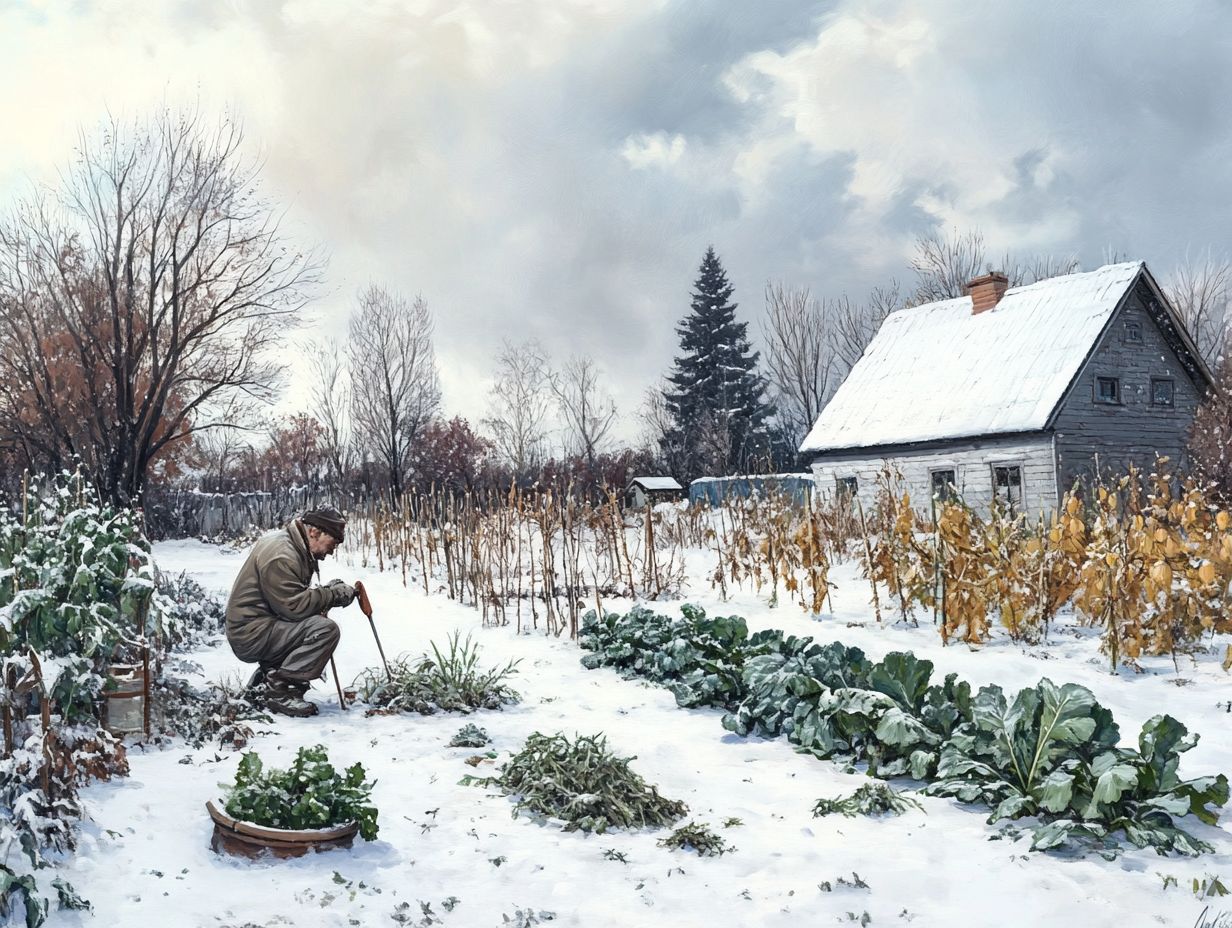
Understanding the various types of weeds annual, biennial, and perennial is essential for effective management in your garden. Each category has distinct characteristics that can significantly influence your garden’s health.
Annual weeds complete their life cycle in just one growing season. They sprout, flower, and die within a few short months.
Biennial weeds establish their roots and foliage in the first year before blooming in the second.
On the other hand, perennial weeds are the long-term inhabitants of your garden, often returning season after season for years.
Identifying these plants is especially beneficial during winter months when invasive species may blend into the landscape. By learning to recognize their defining features, such as leaf shape and root structure, you can spot them early and prevent them from overpowering your garden beds.
Methods for Controlling Weeds in Winter Gardens
You must employ effective strategies to manage weeds in your winter garden. This is vital for safeguarding the health and productivity of your plants as they approach the growing season, and learning about overcoming winter gardening challenges can be incredibly helpful.
You have various options, ranging from traditional weed control techniques to more eco-friendly solutions like organic weed killers.
Implementing mulch and soil amendments plays a significant role in suppressing weed growth while ensuring your plants receive essential nutrients. Choose methods tailored to the specific needs of your garden for optimal results.
Natural and Chemical Solutions
When it comes to controlling weeds, you can choose from both natural and chemical solutions. This allows you to select methods that align perfectly with your values and the needs of your garden.
Natural solutions, like organic weed killers, prioritize environmental sustainability and safety. They are particularly appealing if you prefer chemical-free gardening.
For example, weed killers derived from ingredients like acetic acid or corn gluten meal can effectively suppress weed growth while being gentler on beneficial insects and the surrounding ecosystem.
You might also consider physical removal techniques such as hand-pulling or using tools like hoes or weeding forks. While effective, these methods are often labor-intensive and require ongoing maintenance.
Chemical weed killers provide rapid action and extensive coverage, but they come with risks to health and biodiversity. This demands careful handling and application.
Ultimately, the choice between these methods depends on your individual priorities and the specific circumstances of your gardening environment.
Preventative Measures for Future Weed Growth
Implementing preventative measures against future weed growth is a proactive strategy that can save you time and resources. This ensures your garden thrives for years to come.
By employing effective weed preventers, applying a layer of mulch, and enriching your soil, you can create an environment inhospitable to weeds while promoting healthy plant growth.
These strategies are vital elements of sound garden maintenance. They simplify the process of managing your landscape with ease and elegance.
Tips for Maintaining a Weed-Free Garden
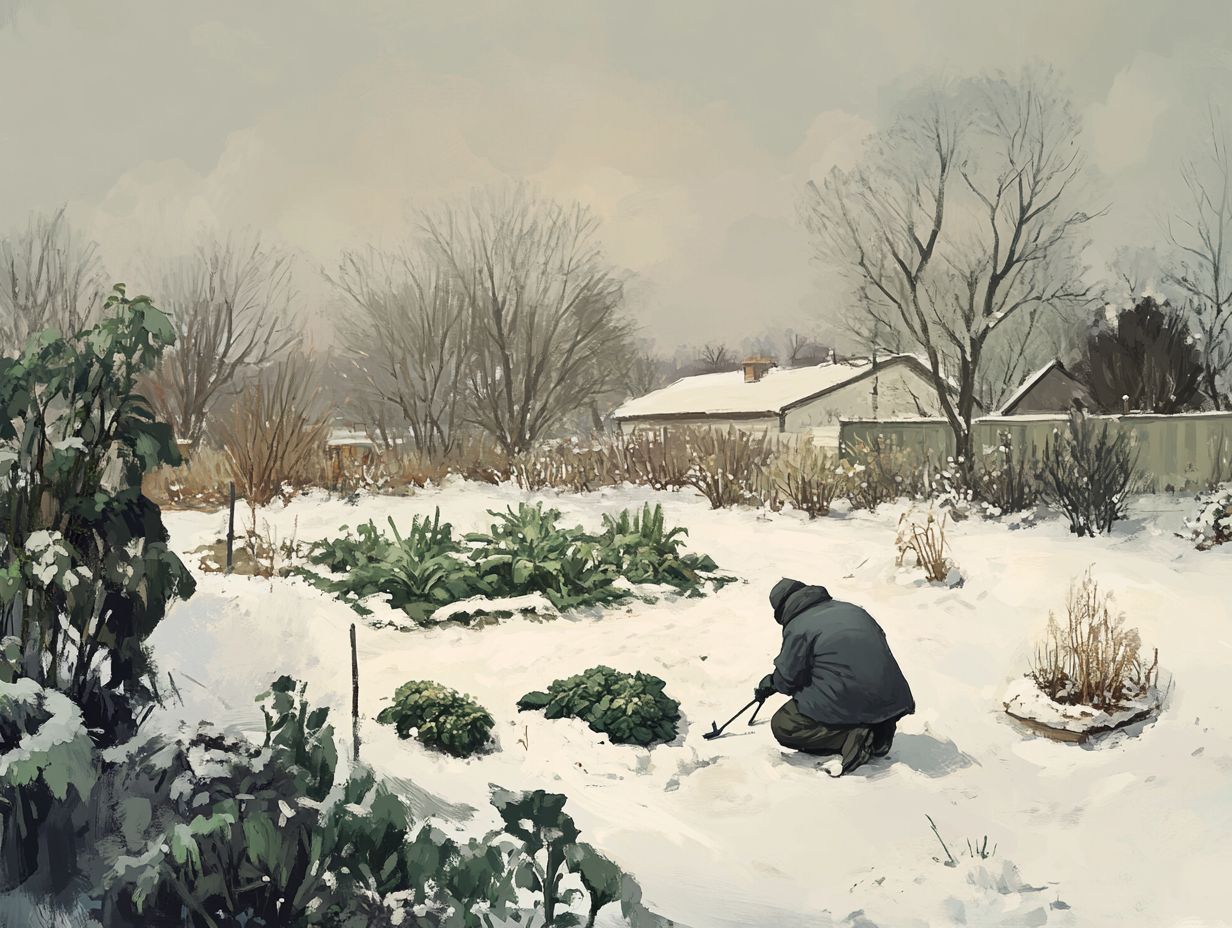
Maintaining a weed-free garden demands your diligence and a thoughtful blend of effective strategies. These enhance overall garden maintenance and plant vitality.
Regular upkeep, such as timely mulching, will significantly reduce weed emergence. It blocks sunlight and retains moisture.
Implementing a mowing schedule that keeps your grass at the optimal height will boost lawn health and discourage weed proliferation.
Integrate soil amendments like compost or organic fertilizers to enrich the soil s nutrient content. This promotes vigorous plant care that competes naturally with unwanted vegetation.
Establish a routine for inspecting your garden beds for emerging weeds. Address them promptly to prevent infestations before they take hold.
Best Practices for Removing Weeds
Employing best practices for removing weeds is crucial for cultivating a pristine and thriving garden. Relying on improper methods can lead to stubborn weed problems and jeopardize the well-being of your cherished plants.
To tackle this challenge effectively, focus on understanding the root systems of different weeds, especially those weeds that can take over your garden quickly. By using organic herbicides and employing strategic removal techniques, you can manage weed populations effectively while preserving the delicate balance of your garden s ecosystem.
Techniques for Safe and Effective Weed Removal
Utilizing safe and effective techniques for weed removal is essential for maintaining a thriving garden while minimizing harm to your cherished plants and the surrounding ecosystem.
By employing methods such as hand-pulling, mulching, and organic herbicides, you can ensure that your actions contribute positively to the overall vitality of your green spaces. Hand-pulling allows you to precisely remove weeds right from the root, significantly reducing the chances of regrowth and protecting the surrounding flora.
Mulching not only blocks sunlight to suppress weed growth but also enriches the soil as it decomposes, offering a dual benefit for lawn care and plant growth. Organic herbicides also provide an efficient means to target invasive weeds without harmful effects associated with synthetic options.
To enhance your safety and efficiency, it s wise to wear gloves, keep your workspace organized, and tackle weeds during dry conditions when the soil is loose, making removal a breeze. Act now to keep your garden healthy!
Frequently Asked Questions
What are the common types of weeds found in winter gardens?
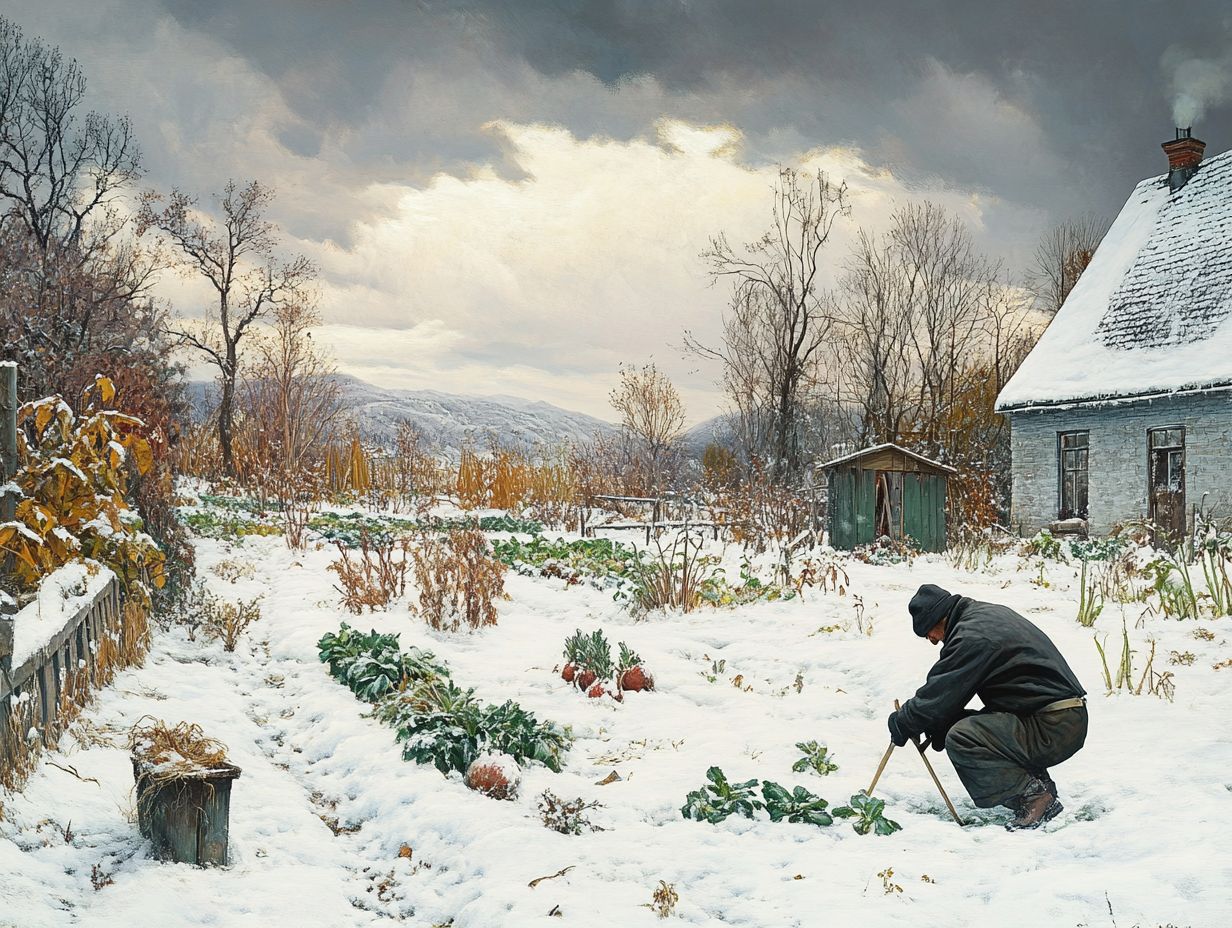
- Dandelions
- Chickweed
- Bindweed
- Wild garlic
- Ground ivy
How can I prevent weeds from growing in my winter garden?
To prevent weeds from growing in your winter garden, it is important to regularly weed and mulch your garden beds. Additionally, selecting plants for a winter garden can help create a more resilient space. Use a product that stops weed seeds from growing before winter.
Are there any natural methods for managing weeds in winter gardens?
Yes, there are several natural methods for managing weeds in winter gardens. These include hand pulling, using vinegar or boiling water to kill weeds, and employing protecting your garden from winter pests as a proactive approach, along with using corn gluten meal as a natural pre-emergent herbicide.
What should I do with weeds that have already taken over my winter garden?
If you have a significant weed problem in your winter garden, it is best to remove the weeds manually or with a tool, such as a hoe or shovel. For more effective solutions, you might consider learning about best practices for winter gardening. You can also use an herbicide, but be sure to carefully follow the instructions and avoid spraying near desired plants.
Can I use mulch to control weeds in my winter garden?
Mulch is an effective way to control weeds in a winter garden. A layer of mulch helps to smother weeds and prevent them from receiving sunlight, which they need to grow. To ensure your garden is ready for the colder months, learn how to winterize your garden. It also helps retain moisture in the soil and regulate the temperature, which can prevent weed seeds from germinating.
Is there a specific time of year to manage weeds in my winter garden?
It is best to manage weeds in your winter garden before they have a chance to take root and spread. This can be done in the fall before the winter season begins or in early spring as the weather starts to warm up. For effective strategies, consider these tips for sustainable winter gardening. Regular maintenance throughout the winter season can also help keep weeds under control.
Do you have any tips or experiences to share? Let us know in the comments!


